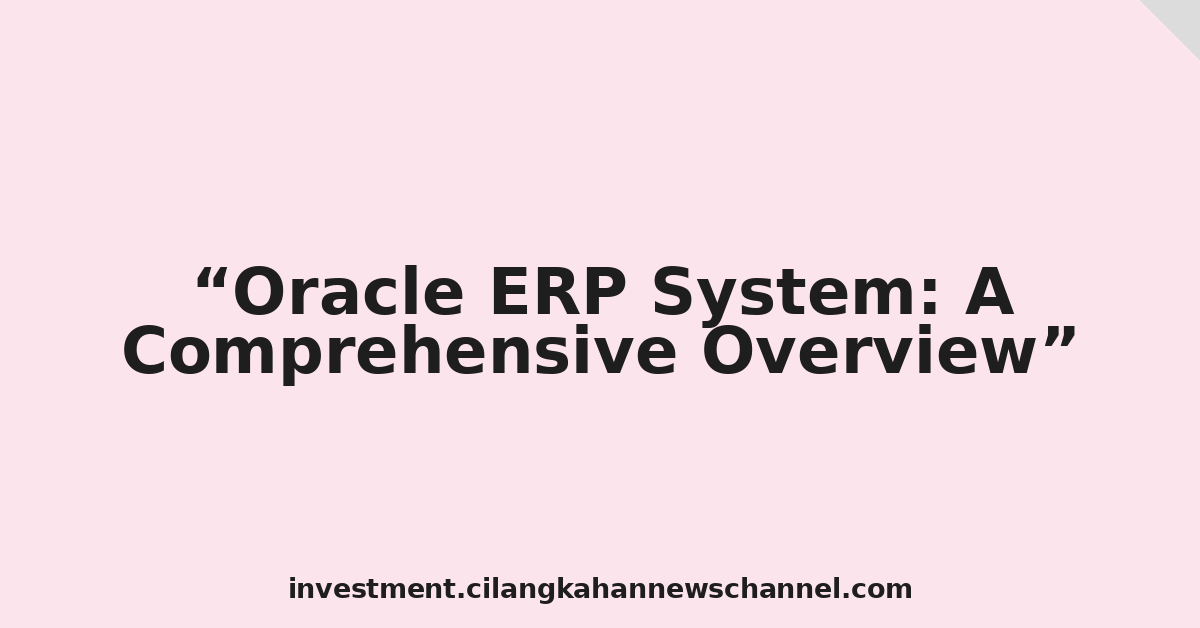Oracle ERP (Enterprise Resource Planning) systems represent a cornerstone of modern business management, offering a comprehensive suite of integrated applications designed to streamline and optimize various operational aspects within an organization. From finance and human resources to supply chain management and manufacturing, Oracle ERP provides a centralized platform for managing critical business processes, enabling better decision-making, increased efficiency, and enhanced profitability. This article delves into the intricacies of Oracle ERP systems, exploring their functionalities, benefits, limitations, and overall significance in the contemporary business landscape.
Hello Reader investment.cilangkahannewschannel.com. Understanding the complexities of Enterprise Resource Planning (ERP) systems is crucial for businesses of all sizes seeking to improve operational efficiency and gain a competitive edge. Oracle, a leading provider of enterprise software solutions, offers a robust and adaptable ERP system that caters to a diverse range of industries and organizational structures. This article aims to provide a detailed overview of the Oracle ERP system, covering its key features, implementation considerations, and the overall value it brings to organizations.
Core Functionalities of Oracle ERP Systems:
Oracle ERP encompasses a wide array of integrated modules, each designed to manage specific business functions. These modules typically include:
-
Financials: This core module manages all financial aspects of the business, encompassing general ledger, accounts payable, accounts receivable, fixed assets, and financial reporting. It provides real-time visibility into financial performance, enabling timely and accurate financial statements and analysis.
-
Supply Chain Management (SCM): Oracle’s SCM module optimizes the entire supply chain, from procurement and planning to manufacturing, logistics, and distribution. It helps businesses manage inventory levels, streamline procurement processes, and improve order fulfillment efficiency. Features include demand forecasting, inventory optimization, and supply chain visibility.
-
Human Capital Management (HCM): This module manages all aspects of the employee lifecycle, from recruitment and onboarding to payroll, benefits administration, and talent management. It helps organizations streamline HR processes, improve employee engagement, and enhance workforce productivity. Features include self-service portals, performance management tools, and talent acquisition capabilities.
-
Manufacturing: For manufacturing businesses, Oracle ERP provides tools for managing the entire production process, from planning and scheduling to production execution and quality control. It enables efficient production planning, optimized resource allocation, and improved product quality. Features include production scheduling, material requirements planning (MRP), and shop floor control.
-
Project Management: This module helps organizations effectively manage projects, from initiation and planning to execution and closure. It provides tools for tracking project progress, managing resources, and monitoring costs. Features include project planning, resource allocation, and project tracking dashboards.
-
Customer Relationship Management (CRM): While often a separate system, Oracle’s ERP can integrate with CRM systems to provide a holistic view of customer interactions and data. This integration allows for improved customer service, enhanced sales processes, and better marketing strategies.
Benefits of Implementing an Oracle ERP System:
Implementing an Oracle ERP system offers numerous benefits to organizations, including:
-
Improved Efficiency: By automating and streamlining business processes, Oracle ERP reduces manual tasks, minimizes errors, and improves overall operational efficiency.
-
Enhanced Visibility: The centralized database provides real-time visibility into all aspects of the business, allowing for better decision-making and improved control.
-
Reduced Costs: Automation, improved efficiency, and reduced errors contribute to significant cost savings in the long run.
-
Better Collaboration: The integrated nature of the system fosters better collaboration across different departments and functions.
-
Improved Data Accuracy: Centralized data management ensures data accuracy and consistency, eliminating data silos and inconsistencies.
-
Scalability and Flexibility: Oracle ERP systems are designed to scale with the growth of the business, adapting to changing needs and requirements.
-
Increased Agility: The system enables businesses to respond quickly to market changes and customer demands.
-
Improved Compliance: Oracle ERP helps organizations meet regulatory compliance requirements, reducing the risk of penalties and fines.
-
Enhanced Reporting and Analytics: The system provides robust reporting and analytics capabilities, enabling data-driven decision-making.
Limitations of Oracle ERP Systems:
Despite its numerous benefits, Oracle ERP systems also have certain limitations:
-
High Implementation Costs: Implementing an Oracle ERP system can be expensive, requiring significant upfront investment in software, hardware, and consulting services.
-
Complex Implementation: The implementation process can be complex and time-consuming, requiring specialized expertise and careful planning.
-
Customization Challenges: While highly customizable, customizing Oracle ERP can be challenging and may require significant development effort.
-
High Maintenance Costs: Ongoing maintenance and support costs can be substantial.
-
Steep Learning Curve: Users may require extensive training to effectively utilize the system’s functionalities.
Choosing the Right Oracle ERP Solution:
Oracle offers a range of ERP solutions to cater to different business needs and sizes. Choosing the right solution requires careful consideration of several factors, including:
-
Business Size and Complexity: The size and complexity of the organization will dictate the specific modules and functionalities required.
-
Industry-Specific Requirements: Certain industries have unique requirements that need to be considered when selecting an ERP solution.
-
Budget and Resources: The available budget and resources will influence the scope and complexity of the implementation.
-
Integration Requirements: The need to integrate with existing systems should be carefully evaluated.
-
Future Scalability: The chosen solution should be scalable to accommodate future growth and expansion.
Conclusion:
Oracle ERP systems offer a powerful and versatile solution for organizations seeking to streamline their operations, improve efficiency, and gain a competitive advantage. While the implementation process can be complex and costly, the long-term benefits often outweigh the initial investment. By carefully considering the organization’s specific needs and requirements, businesses can leverage the power of Oracle ERP to achieve significant improvements in their operational performance and overall business success. However, it is crucial to conduct thorough due diligence, carefully assess the costs and potential challenges, and choose a solution that aligns with the organization’s long-term strategic goals. The success of an Oracle ERP implementation hinges on careful planning, effective project management, and ongoing user training and support. With a well-planned and executed implementation, Oracle ERP can become a valuable asset, driving growth and profitability for years to come.

